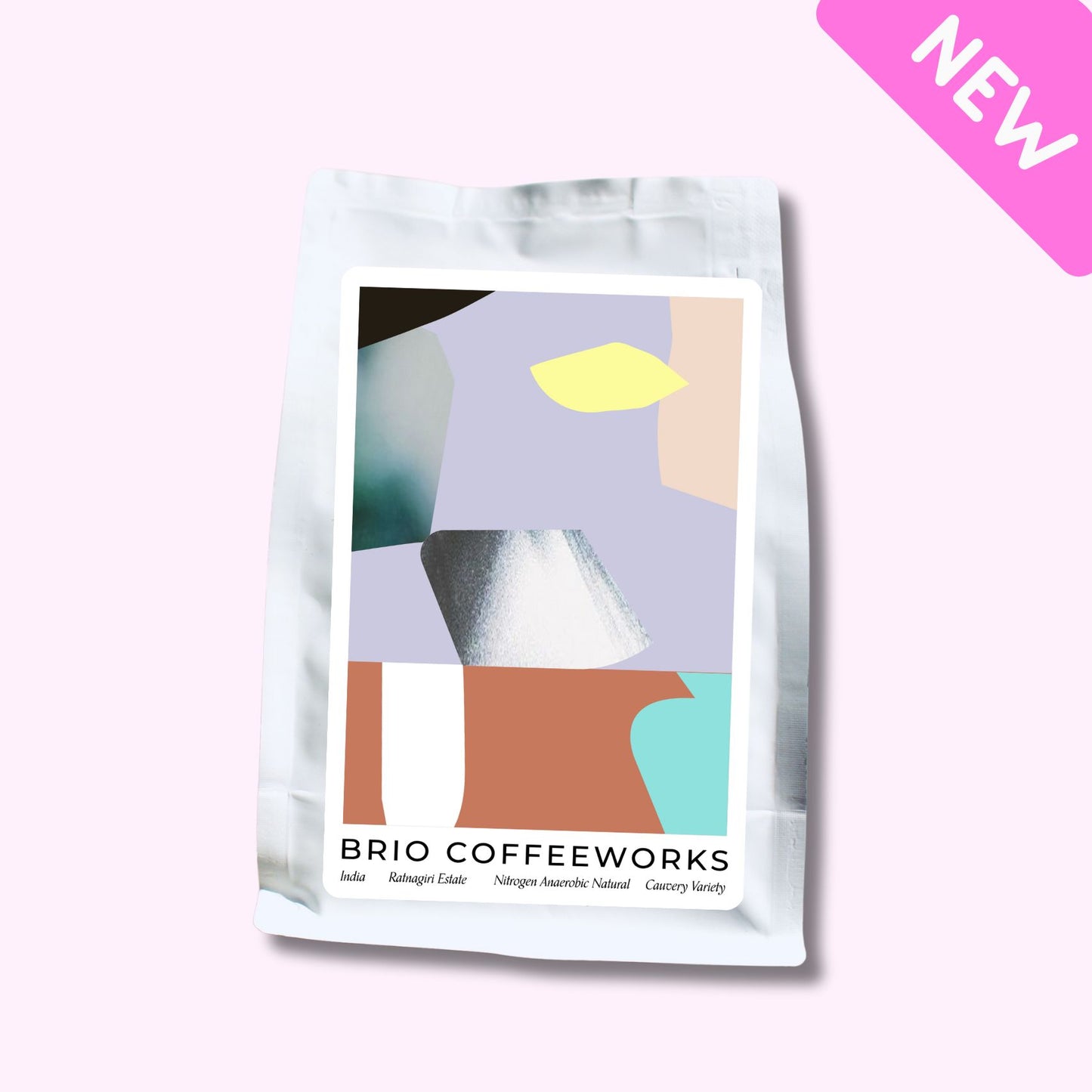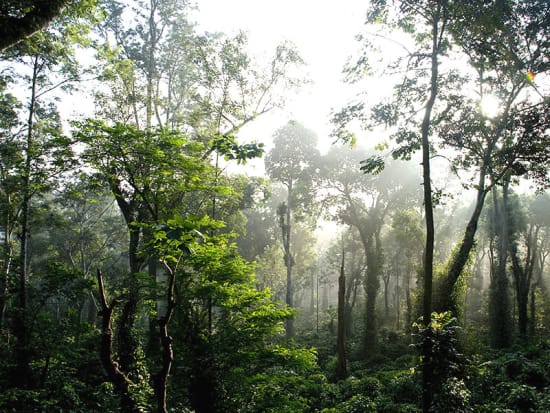India Ratnagiri Estate Nitrogen Anaerobic Natural Microlot - 12 oz.
India Ratnagiri Estate Nitrogen Anaerobic Natural Microlot - 12 oz.
Couldn't load pickup availability
Tasting notes: Jammy raspberry, panela, fresh cantaloupe, passion fruit, winey acidity.
12 oz.

In the Cup
This coffee definitely caught our attention on the cupping table and we promise it will deliver an exciting cup! It offers a fruit-forward profile of berries, tropical fruit, and cantaloupe. Underneath, you'll find lots of sugary sweetness and red wine-like acidity. Perfect for when you want a cup with real character!
The Farm & The Producer
Ashok Patre has been running Ratnagiri Estate since 1989, transforming it from a traditional coffee farm into a specialty coffee powerhouse. In 2010, he noticed specialty coffee gaining momentum worldwide and by 2016, he took a bold step—producing his first honey-processed coffees in a country where 75% of production was Robusta.
This wasn't just a business decision; it was survival against rising costs and climate challenges. Ashok transformed every aspect of production—implementing selective picking, building infrastructure, and focusing on eco-friendly farming.
Ashok's farm is nestled in the southwestern foothills of the Western Ghats mountain range, where silver oak trees provide perfect shade for the coffee plants below. Today, 60% of Ratnagiri Estate's 117 hectares is reserved for specialty-grade coffee. Ashok is committed to environmentally friendly practices, using only organic fertilizers and natural pest control methods. Since 2016, he's been exploring innovative processing methods - from carbonic maceration to yeast fermentation - showcasing Indian coffee in an entirely new light.
Ashok's forward thinking and innovations on the farm challenge what good coffee is and where it comes from—truly changing the landscape of specialty coffee.
Varietal
The Cauvery varietal is a descendant of Catimor, a cross between Caturra and Timor. Variations of Catimor are typically grown due to its resistance to leaf rust, higher yield, and this particular decendent, for its great flavor potential.
More On Processing
This coffee gets its distinctive flavor profile from undergoing a careful nitrogen anaerobic natural processing method. After harvesting the cherries once the degrees Brix is over 24 (only the ripest making the cut), they are sealed in stainless-steel tanks for 80-120 hours, creating an anaerobic environment. Unlike typical carbonic maceration which uses carbon dioxide, Ratnagiri Estate uses nitrogen gas to displace oxygen allowing the coffee to undergo nitrogen anaerobic fermentation for 80-120 hours. The nitrogen better displaces oxygen, prevents oxidation and unwanted microbes, and significantly impacts flavor by intensifying fruit notes and acidity while slightly increasing body and creating a pleasant lingering mouthfeel. After fermentation, the cherries are moved to raised beds, and dried slowly with constant stirring over the next 25-30 days.
Specialty Coffee in India
While India is the world's sixth-largest coffee producer (with the Karnataka state producing 65% of the country's coffee), it's still emerging in the specialty coffee scene. According to legend, a Sufi saint smuggled seven coffee seeds from Yemen by hiding them in his beard and planted them in the Karnataka hills. Today, while about 75% of India's production is still Robusta, forward-thinking producers like Ashok are highlighting the potential of Indian-grown specialty coffee. The Western Ghats region offers ideal growing conditions with its unique climate and elevation, creating the perfect recipe for exceptional coffee. This Ratnagiri Estate coffee is proof that Indian specialty coffee deserves a place in your brewing rotation!
This coffee is part of our Microlot Artist Collaboration Series. The label was designed by the talented Phoebe Lo, inspired by her first sip.

Share







This was different! The processing has a heavy hand and imparts a distinctive taste to these Indian beans.
I brewed my first V60 batch immediately upon receipt from the roaster, Brio, only a couple of days off roast. My first impressions were not great. Aroma and taste were completely driven by the heavy processing, with little room for nuance.
Fade to black. It’s now just over two weeks post roast, and I’m sitting here with another freshly brewed V60 carafe. The taste notes and fragrance have been greatly improved and mellowed out. There is a hit of flavor from these beans that I am enjoying. For me, these beans provide a nice change of pace from my everyday single origin specialty coffees. It’s a nice shake up to my usual brews and I would recommend this bean to any adventurous coffee drinkers who are looking for a change of pace and a WOW factor in a unique brew.
In sum, a wowzer of a coffee you’ll remember and a nice change of pace. I would not drink this brew every day, but I do enjoy its unique aroma and flavor notes from time to time.
These beans are not for everyone as the flavors are non-traditional and quite bold. Allow these beans sufficient time to rest.








